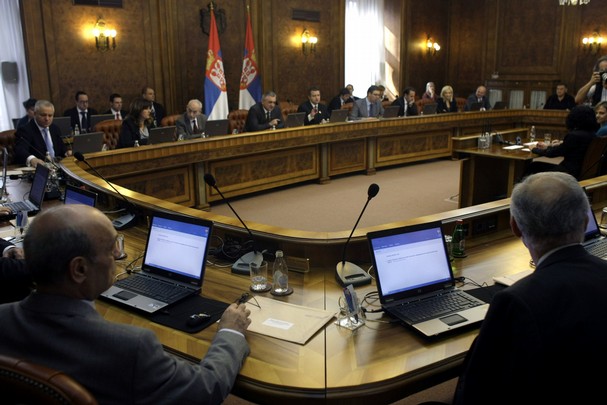By Associated Press
BELGRADE, Serbia — Thousands of Serb demonstrators, chanting “Treason, Treason,” protested Monday against an agreement to normalize relations with breakaway Kosova, a potentially landmark deal that could end years of tensions between the Balkan antagonists and put them both on a path to European Union membership.
Up to 10,000 flag-waving protesters gathered in the divided northern Kosova town of Mitrovica, demanding that the EU-brokered agreement be annulled and branding the Serbian officials who endorsed it “traitors.” Thousands also marched in Belgrade, the Serbian capital.
The Serbian government on Monday approved the deal unanimously at an extraordinary session and ordered ministries to implement it.
The prime ministers of Serbia and Kosova reached a tentative deal in Brussels on Friday that would give Kosova’s ethnic Albanian leadership authority over rebel Kosova Serbs. In return, the minority Serbs would get wide autonomy within Kosova.
After Serbia’s approval, the EU’s executive Commission recommended on Monday that the bloc start membership negotiations with Belgrade. The Commission said in a report that “Serbia has taken very significant steps toward visible and sustainable improvement in relations with Kosova.”
“This agreement is a huge step forward. It can mark a historic turning point for the two countries, but also for the entire region if it is implemented,” German Foreign Minister Guido Westerwelle said at an EU meeting in Luxemburg.
Kosova, which is considered by nationalists to be the medieval cradle of the Serbian state and religion, declared independence in 2008. Serbia has vowed never to recognize it, and Serbian officials insist that the latest agreement does not mean Belgrade has de-facto recognized Kosova’s statehood.
It is not clear how the deal will be implemented on the ground in northern Kosova where hardline Serb leaders vehemently reject any authority coming from Prishtina’s ethnic Albanians and consider the region a part of Serbia.
In Mitrovica, hardline Kosova Serbs said they will prevent the implementation of the agreement and form their own, self-ruled region in the north.
On Sunday, Kosova’s parliament voted in favor of a resolution to support the agreement. The Serbian parliament is expected to do the same later this week.
The influential Serbian Orthodox Church on Monday, however, denounced the deal as a “clear surrender” of “our most important territory,” and urged the country’s lawmakers to reject it.
The church said in a statement that the deal amounts to “indirect and silent, but still de-facto recognition” of the Kosova state.
The deal allows Serbs to police and manage the north of Kosova, which is inhabited predominantly by ethnic Serbs, in exchange for nominal recognition of the authority of the Kosova government. It also calls for the two sides not to obstruct one another as they seek eventual membership in the EU.
Serbia relinquished control of most of Kosova in 1999 when NATO chased its troops out of the region after a three-month bombing campaign. Ending the partition of Kosova between the Albanian majority and the Serb-controlled north — about a fifth of the country — is a key condition of Serbia’s further progress toward EU membership.
Associated Press writers Jovana Gec in Belgrade, Raf Casert in Brussels, Zvezdan Djukanovic in Mitrovica and Juergen Baetz in Luxembourg contributed to this report.
